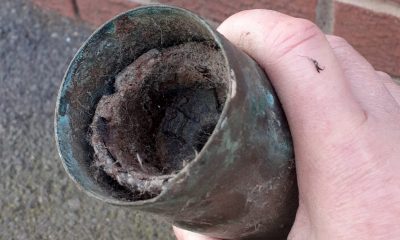By Mark Waghorn via SWNS
A new drug has cured advanced prostate cancer - in dogs.
The antibody dramatically improved survival rates by boosting pet pooches' immune systems.
It could be a significant breakthrough in combating the most common form of cancer in men.
Lead researcher Dr. Shingo Maeda, of Tokyo University, said: "Thankfully 'man's best friend' is once again coming to the rescue."
Dogs are a far better scientific model than mice - the typical animal used in the lab.
Dr. Maeda explained: "The prostate glands of dogs share a great deal of similarities with those of people.
"They are actually the only other animal that suffers from a significant incidence of prostate cancer.
"The cancer has very similar clinical features - including late-age onset and the pattern of cancer growth - to that in humans."
It's the first time canines have been used in a study of aggressive prostate cancer.
The Japanese team identified white blood cells that block a gene known as CCR4 that fuels tumours.
They used them to clone an antibody drug called mogamulizumab. It attacks immune system cells named Tregs that helps spread the disease.
They are 'suppressor cells' - ensuring healthy cells are not attacked. Prostate cancer cells can trick them into leaving them alone.
Dogs with naturally occurring prostate cancer showed decreased circulation of Tregs.
They were more likely to live than peers not given the therapy. There were also few adverse events.
The findings in the Journal for ImmunoTherapy of Cancer open the door to clinical trials.
Prostate cancer kills more than 12,000 men in the UK each year - with around 52,300 new cases diagnosed annually.
Drugs can treat advanced disease in the short term - after which prognosis is usually gloomy.
Expression of the gene FOXP3 is necessary in turn for the production of Tregs.
Reducing the number of Tregs offers hope of an immunotherapy for patients with advanced prostate cancers.
Experiments in mice perform extremely poorly at predicting the results in human trials because their cancers are very different.
Genes, immune responses and even symptoms vary - along with how the diseases progress.
Prostate cancer in pet dogs serves as a bridge between the use of lab rodents and proceeding to trials in human patients.
In addition - as dogs have a shorter life span than humans - studies could be conducted over a shorter period, said the researchers.
So they used 'man's best friend' to analyze molecular mechanisms behind Tregs and to check the effect of the drug.
Having demonstrated the use of dogs as a model, the researchers now hope to perform clinical trials and continue research on anti-CCR4 drugs in patients.
The study is in the Journal for ImmunoTherapy of Cancer.

 Parenting1 day ago
Parenting1 day ago
 Broadcast3 days ago
Broadcast3 days ago
 Broadcast2 days ago
Broadcast2 days ago
 Broadcast1 week ago
Broadcast1 week ago
 Funny1 week ago
Funny1 week ago
 Shopping1 week ago
Shopping1 week ago
 Money3 days ago
Money3 days ago
 Parenting1 week ago
Parenting1 week ago






















